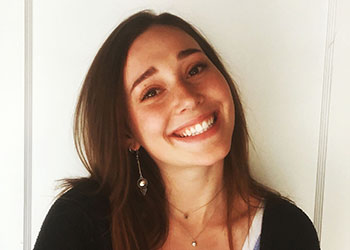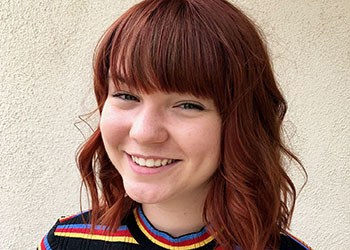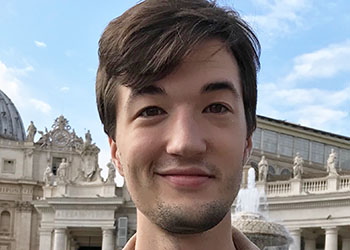Meet some of our history majors.
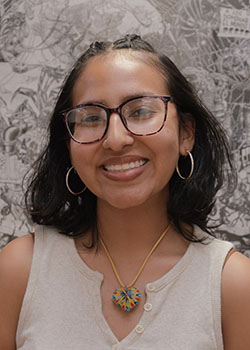
Yenni Gonzalez Salinas ’25
Hometown: Nashville, TN
Major: history Minor: Latino/Latina & Latin American Studies
What was your motivation to major in history?
I've always been drawn to history classes. As a first-generation college student, I initially hesitated to major in history, concerned about its relevance to my future, especially with law school in mind. My perspective shifted after taking Professor Alexandra Puerto's course Health on the Move: Immigrant and Refugee Resilience and Professor Michael Gasper's course Pandora's Box: 9/11, Iraq, Afghanistan, and the United States. These classes were pivotal in steering me towards a history major. Health on the Move intertwined my interests in history, labor studies, and law, highlighting the health disparities faced by migrant farm workers, a result of the U.S. viewing them merely as cheap labor. In Pandora's Box, Professor Gasper encouraged us to think more critically about the U.S.'s involvement in the Middle East, prompting us to question the nature of U.S. engagement and to explore broader themes of empire, nationhood, and national identity in both the U.S. and the Middle East. Both of these courses not only honed my critical thinking skills but also provided an intellectual engagement I hadn't found in any other department. Professor Gasper became my adviser, while Professor Puerto oversaw my summer research in 2023. In learning more about the law school application process, I learned that grades, writing ability, and critical thinking skills are paramount, regardless of major. I'm genuinely pleased I chose history, a field that challenges me intellectually and keeps me captivated. This decision has also allowed me to deeply explore new interests I developed during my college journey.
In learning more about the law school application process, I learned that grades, writing ability, and critical thinking skills are paramount, regardless of major.
Can you describe your working relationship with history professors?
All of the history professors are amazing! They're always ready to meet up, whether it's to chat about academic stuff or personal matters. History professors genuinely care about you and your wellbeing. To them, you're more than just a student; you're a person who might face struggles, and they're committed to ensuring you're on the right path to succeeding in all your classes. I've worked closely with Professor Gasper and Professor Puerto and they've both pushed me and helped me achieve goals I never thought would be possible on my own. At the same time, they've made sure I'm taking care of myself and not heading towards burnout. Even though the history professors at Occidental are some of the toughest graders I've encountered, it's clear they truly want you to succeed. Earning an A on a history paper proves you're capable of taking on any writing assignment. I cherished the opportunity to learn from Professor Jane Hong in her United States Culture and Society class. She inspired me to share my insight on the material we covered, validating its importance; by the end of the semester, I saw the clear boost in my confidence. Her encouragement significantly increased my comfort level in staying in a field where women are notably underrepresented.
[To the history professors], you're more than just a student; you're a person who might face struggles, and they're committed to ensuring you're on the right path to succeeding in all your classes.
Do you have any advice for a student considering a major in history?
First off, if you haven't taken a class yet, go for it. You'll never know if it's right for you unless you try! If you've already taken a class but are still undecided, I'd suggest talking to an upperclassman about their experience as a history major. I had a chat with Occidental alumnus Andrez Parra ’23 about my indecision and fear of picking the wrong major. He told me he became a history major almost by accident after realizing he had enough credits to justify the major. That made me check my own course counts and, to my surprise, I was already more than halfway through the requirements. If you're still unsure, talking to a professor can help. Share your concerns or ask why you might hesitate to choose history. They're incredibly understanding and will gladly address your questions. Remember, no matter what major you end up choosing, everyone will be proud of you.
Have you taken part in any student research opportunities at Oxy or elsewhere?
In the summer of 2023, I participated in a research project through Occidental’s Undergraduate Research Center, under the guidance of Professor Puerto. I investigated the responsibilities of the Mexican government to its citizens during the Bracero Program Era. I argued that the Mexican government’s desire for diplomatic relations with the U.S., efforts to foster economic growth, and pursuit of racial modernization through this program unfortunately resulted in the neglect of its citizens' well-being. This was my first time conducting summer research, and honestly, I had no idea what I was getting into. But it was incredibly fulfilling. I picked up skills in navigating special collections and sourcing both primary and secondary materials. The entire journey sparked my curiosity for exploring more research avenues. This summer, I’ll be interning for the Department of Justice, where I'll collaborate with a group of historians on research for the Human Rights Prosecution Sector. For a deeper dive into the history of HRSP, check this out!
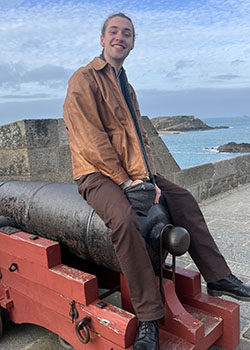
Henry Kinskey ’25
Pronouns: They/them/theirs
Hometown: Seattle, WA
Major: history Minors: geology, Latino/Latina & Latin American Studies
Can you describe your working relationships with history professors? Are there any standout classes you’ve taken?
Every history class I have taken at Oxy has been punctuated by professors who are highly invested in their students and their academic development, have created dynamic and engaging classrooms, and have pushed me out of my comfort zone. Many of the history professors at Oxy teach classes in other academic disciplines, and they carry that breadth of experience into every lecture, which has challenged me to reshape my understanding of how history can be studied.
Liberal arts gave me the freedom to experiment academically, and that freedom allowed me to form connections between distinct areas of study I am passionate about which let me imagine how I could combine those interests to shape my future.
What are your ambitions post-Oxy and how has the liberal arts approach helped to shape these ambitions?
Liberal arts gave me the freedom to experiment academically, and that freedom allowed me to form connections between distinct areas of study I am passionate about which let me imagine how I could combine those interests to shape my future. After Oxy I see myself taking time off to build working skills that complement academic knowledge and then pursuing a degree in environmental law or public humanities.
What is the “vibe” of the history department?
If Oxy were PBS, we’d be Sesame Street.
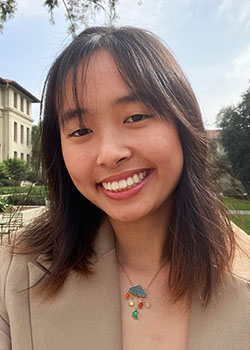
Michelle Teh ’25
Hometown: Hong Kong
Major: history Minor: linguistics
What was your motivation to major in history?
Honestly, I went into college wanting to study anthropology, but history was the closest thing they had at Occidental. Fortunately, a lot of the classes at Oxy are pretty interdisciplinary and some of the studies I've read use anthropological methods.
Can you describe your working relationships with history professors?
I would say I'm pretty close to the history professors, and overall, I love the department. You can tell that every professor is very passionate about what they do, and each professor in the department has their quirks and unique teaching style. I would definitely recommend taking at least one class with Professor Michael Gasper because it will change the way you look at the world. All the professors are great, though, and everything I learn in class feels super relevant to the contemporary world.
I think my liberal arts education has put me in a position where I can be very flexible about what industry I go into, which is nice in this rapidly changing job market.
What do you find most compelling about studying history?
You can't move forward without knowing the past.
What are your ambitions post-Oxy and how has the liberal arts approach helped to shape these ambitions?
I want to be a journalist, or, at the very least, work in communications. I'm hoping to go either into the performing arts industry or environmental journalism. I think my liberal arts education has put me in a position where I can be very flexible about what industry I go into, which is nice in this rapidly changing job market.
To see more Meet Our Majors profiles, visit the main page.

